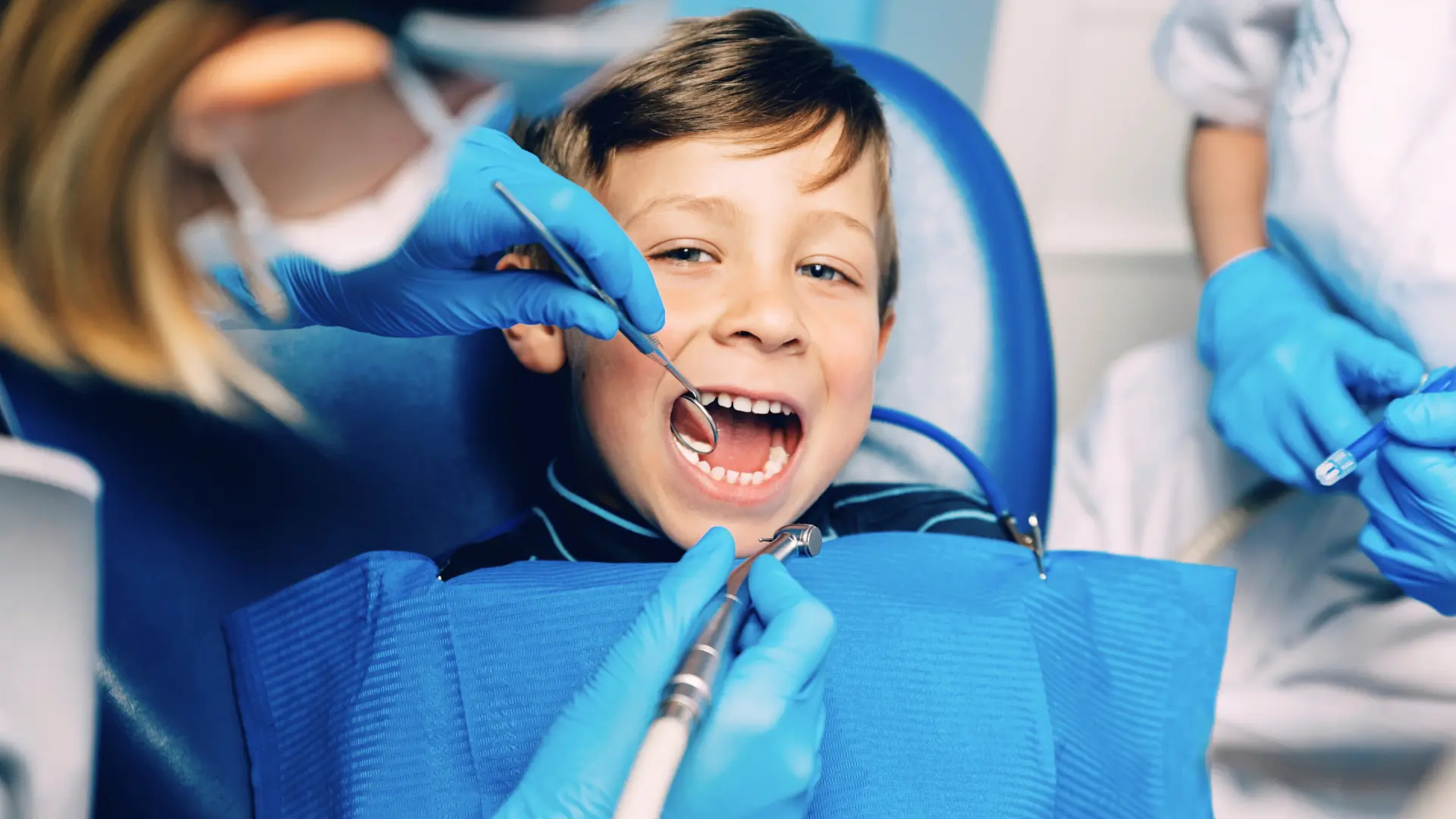Pedodontics
- Home
- Treatments
- Pedodontics
Call our Hotline!
Pedodontics is known as pediatric dentistry and aims to protect, treat and promote the oral and dental health and development of children aged 0-15 years. Dentists specializing in this field diagnose and treat various problems related to children's dental health.

What is Pedodontics?
Pedodontists plan treatment processes by taking into account both physiological and psychological factors while following the dental development of children.
The treatment process usually starts with the child's first dental examination. When the first baby tooth erupts, it is recommended that the child visits the dentist. During this examination, the condition of the teeth is assessed and any necessary preventive treatments, such as fluoride applications and fissure sealants, are applied. In addition, procedures such as treatment of dental caries, management of dental trauma and orthodontic guidance are also included in the scope of pedodontics. Pediatric dentists take care to create a fun and comfortable environment to reduce children's fears during treatment.
Pediatric dentistry includes not only treatment but also preventive health services. In this context, oral hygiene education, healthy eating habits and the importance of regular dental examinations are emphasized. Pedodontists also inform families and help them take the necessary precautions to protect children's dental health. In this way, children are encouraged to develop positive habits towards dental health and future dental problems are prevented.
Why is Pedodontics Important and Why is it Performed?
Pedodontics is known as pediatric dentistry and is a specialty that aims to protect, treat and improve the oral and dental health of children. The importance of this field is that children's dental health includes not only treating existing problems, but also preventive measures to prevent future dental problems.
- Erken Intervention: Pedodontics monitors children's dental development, enabling early detection and intervention of potential problems. This reduces the need for more extensive and costly treatment.
- Special Needs: Children can face certain challenges in terms of dental health, for example, teething, habits such as thumb sucking or tooth decay with a baby bottle. Pedodontists have specialized knowledge and skills to manage such problems.
- Education and Awareness Raising: Pedodontics helps children and their families become aware of oral hygiene habits. Dentists educate children on proper brushing techniques, healthy eating habits and methods of maintaining dental health.
- Psycho-social Development: Pediatric dentistry enables children to have a positive dental experience by reducing their fear of the dentist. This helps children develop a positive attitude towards dental health.
As a result, pedodontics plays a critical role in ensuring that children have a healthy mouth and dentition. This specialty not only protects children's dental health, but also contributes to their overall health and development.
Which Procedures Are Performed Under Pedodontics?
Pedodontics is known as pediatric dentistry and applies various procedures and treatment methods to protect the oral and dental health of children aged 0-13 years. The procedures performed in this field are critical to support children's dental development and prevent potential problems.
- Fluorine Applications: To prevent tooth decay, fluoride treatment is used to strengthen tooth enamel. This is important to reduce the risk of tooth decay in children.
- Fissure Sealant Applications: Sealing deep grooves (fissures) on the tooth surface prevents bacteria from accumulating in these areas and prevents the formation of caries.
- Placeholders In case of early loss of deciduous teeth, space maintainers are applied so that the permanent teeth can erupt properly. This is necessary to maintain the alignment of the teeth.
- Dental Fillings: Fillings are used to treat decay in deciduous and permanent teeth. This is a critical step to maintain the health of the teeth.
- Root Canal Treatment: Root canal treatment can be performed to treat root infections in milk teeth. This is important to prevent tooth loss.
- Amputation Treatment: It is the process of removing infected or decaying parts of the tooth. If this treatment is not effective, root canal treatment or tooth extraction may be performed.
- Orthodontic Treatments: Orthodontic interventions are performed when necessary for the early detection and treatment of orthodontic problems during the dental development of children.
- Tooth Extraction Extraction of teeth that cannot be treated is a last resort to protect children's oral health.
These procedures are expertly performed by pedodontists to protect children's dental health and prevent future dental problems. Pedodontics plays a critical role in ensuring that children have a healthy oral structure.
Why are milk teeth important?
Milk teeth play an extremely important role in children's oral health and overall development. Here are some key points about why baby teeth are so important:
- Development of Permanent Teeth: Milk teeth act as guides for the permanent teeth to erupt. If deciduous teeth are lost prematurely, the proper eruption of the permanent teeth can be prevented and this can cause the teeth to erupt in malformed positions.
- Nutrition and Speech: Milk teeth help children to eat properly and develop speech skills. Healthy milk teeth help children chew solid foods and have a positive impact on speech development.
- Self-confidence and Aesthetics: Neat and healthy baby teeth increase a child's self-confidence. The appearance of the teeth affects the child's smile and plays an important role in social relationships. Healthy milk teeth give the child self-confidence.
- Dental Care Habits: Milk teeth provide an opportunity to teach children the habit of regular dental care at an early age. Regular brushing of the teeth and regular check-ups with the dentist help the child to maintain good oral health.
- Future Health: Maintaining healthy milk teeth is of great importance for the proper development of future permanent teeth and for the overall health of the child. Neglected milk teeth can lead to tooth decay and gum disease.
Primary teeth are critical for children's oral health and overall development. For this reason, milk teeth should be regularly monitored, decay prevented and treated. It is important for children to have regular dental check-ups to maintain a healthy oral structure.
What are the Benefits of Pedodontics?
Pedodontics is a branch of dentistry that specializes in protecting and treating children's dental health. This field has many benefits:
- Early Detection and Prevention: By monitoring children's dental development, pedodontics offers the possibility to detect and prevent problems at an early age. This helps to prevent bigger health problems later on.
- Special Approach to Children: Pedodontists have received special training tailored to the needs of children. In this way, they make children feel more comfortable during dental examinations. In a child-friendly environment, they offer a positive experience by reducing the fear of dentists.
- Oral Hygiene Education: Pedodontics plays an important role in teaching children oral hygiene habits. Teaching basic habits such as brushing and flossing is critical for children's future dental health.
- Impact on General Health: Dental health has a direct impact on overall health. Healthy teeth support children's proper nutrition and speech development. In addition, tooth decay and other oral health problems can negatively affect children's social life and self-esteem.
Pediatric dental treatments play a critical role in protecting, treating and promoting children's dental health. Therefore, regular check-ups and treatment processes for children's dental health are of great importance.

How is Pediatric Dental Treatment Done?
Pedodontics uses various methods to maintain and treat children's dental health. The treatment process usually involves the following steps:
Inspection and Evaluation
Anesthesia Application
Treatment Methods and Implementation
Training and Information
Follow-up Checks
Her treatment offers a comprehensive approach to maintaining and improving children's dental health. Each treatment is customized to the individual needs of the child.
Frequently Asked Questions About Pedodontics
We have also answered some of the frequently asked questions about the pedodontic procedure in detail for you. If you have different questions you are curious about, do not hesitate to ask us.
When should my child's first visit to the dentist be?
How often should children brush their teeth?
How can I prevent tooth decay in children?
When should we start using toothpaste?
Children can start using toothpaste containing fluoride when their teeth start to erupt, usually around 6 months. However, the amount of toothpaste should be small
Is going to the pediatric dentist scary for children?
When should you start flossing?
How to manage dental trauma in children?
What is fluoride treatment and is it necessary for children?
Should milk teeth be treated?
Why Choose Us?
About the Clinic
Do you have dental problems? Contact us now!
Clinic Address
Contact Information
+90 533 397 65 56

